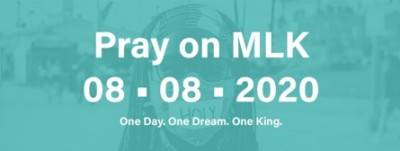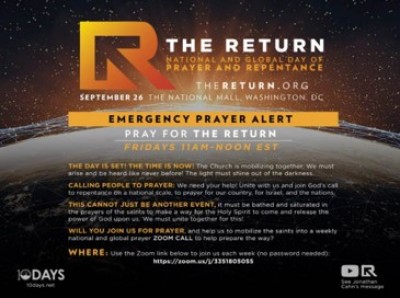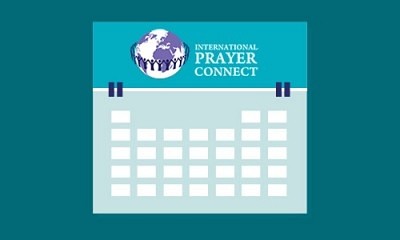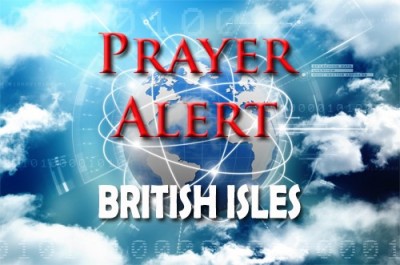The call for the Church to unite as One Voice on One Day to pray for One Dream for the glory of One King (Jesus!)
Pray on MLK is a two hour, nationwide prayer and worship event on Saturday, August 8, located along every Martin Luther King Jr. street or memorial in the United States (and around the world).
We believe that the Church has the solution to the racial tension in the U.S. and across the globe. To put feet to our faith, we are forming multi-cultural human prayer chains across the world.
Imagine a day where over a thousand separate groups across the world unite with one voice, one prayer request, before one King.
We believe the reverberations of this unified moment of supplication and worship will be felt for years to come.
Watch the video: https://www.youtube.com/watch?v=6kA0Xyn7yWo
As people of faith take their place on the walls of history, we hear the chains of injustice breaking. It’s time to turn our tears into triumph, our weeping into worship, and leap forward into a new era of righteousness in the united pursuit of God’s dream for all people.
Would you partner with us to help lead one of these gatherings in your city? For more information and/or to register as a local director, go to www.prayonmlk.org
Pastor Jonathan Tremaine Thomas, Founder & CEO
Civil Righteousness, Inc.
www.civilrighteousness.org
www.prayonmlk.org
‘10 Days’ Joins ‘The Return’ in Calling Christians to Worldwide Prayer, Fasting, Repentance
Thousands To Converge on Washington Mall for ‘The Return’ on Sept. 26, Flanked by Prayer Inspired by Ancient ‘10 Days of Awe’' Sep 18-28, 2020
NEW YORK—As political discord and a pandemic threaten societies around the world, prayer movements are gaining momentum and some have united to shape a global Christian revival with Washington, D.C., at its epicenter.
Thousands of Christians and more than 100 denominations of churches have committed themselves in prayer and collaboration leading up to “The Return: National and Global Day of Prayer and Repentance.”
“The Return” (TheReturn.org) is set for 40 days before the presidential election, and on the 400th anniversary of the sailing of the Mayflower, in the days of America’s founding and dedication to God. Surrounding the “The Day of Return” on Sept. 26 at the Washington Mall will be 10 days, known from ancient times as the Days of Awe, to be set as a special time of prayer and repentance on Sept. 18-28.
“10 Days” (10days.net), a movement of prayer, fasting, and repentance in unity based on the 10 Days of Awe, has been invited to collaborate with “The Return” as movement leaders call Americans to turn from sin and humble themselves before God.
“We are in the midst of a multi-faceted crisis right now, a crisis that no human being knows how to solve,” said “10 Days” leader Jonathan Friz. “An insoluble problem should lead us to self-reflection. What if instead of blaming one another, we took time to consider how our own actions and self-will have contributed to the current state of political division, racial strife, pestilence? What if instead of placing ourselves on a pedestal as judge, we would humble ourselves before the only Judge, and seek His mercy in a time of national and global calamity?”
Echoing Jesus’s prayer at the Last Supper that His followers would be unified, “The Return” and “10 Days” are pooling efforts to inspire Christians everywhere to call on the name of the Lord as the only source of hope for their countries.
Ramping up to the September climax, “10 Days” is leading a three-pronged prayer strategy for “The Return” that includes personal intercession for movement leaders, weekly Zoom prayer calls, and a “Consecration Challenge” aimed at mobilizing 120,000 believers in dedicated prayer and fasting.
Grant Berry and Jonathan Friz are working with “The Return” by leading the weekly global prayer intercession.
Coordinated events within “The Return” movement will also take place throughout America’s cities, towns, houses of worship and homes, as well as in multiple countries around the world, as many believe the nation has been given a critical window of opportunity to repent and return to God.
Visit “The Return” at www.TheReturn.org to register and learn more. Follow “The Return” on social media at Facebook: @ReturnEvent2020; Twitter: @2020_Return; and Instagram: @The_Return2020.
Two brief videos about The Return's reaching out to make it an international effort:
https://www.youtube.com/watch?v=vYZ-YtAHlo8&
https://www.youtube.com/watch?v=u4bXDhLefQc&
Please contact Jonathan Friz at This email address is being protected from spambots. You need JavaScript enabled to view it. for more information on how your nation can participate.
2020 a year of evangelism across the UK
90 Days of HOPE - to 31 August 2020
Global Day of HOPE – 29 August 2020
www.globalvoiceofprayer.com
Intercessors at the Summit...Soaring Like Eagles.
July 31 - Aug 1. (Start at 9am Jamaica time)
www.nipnoj.org
Prayer Day for end to Pandemic – 2 August 2020
www.nationaldayofprayer.org.au/events/pandemic-prayer
Pray on MLK - 08-08-2020
The Return / 10 Days: 18-28 September 2020
www.thereturn.org | www.10days.net
National Prayer Assembly (USA), Washington, D.C., October 14-15
www.nationalprayerassembly.com
Contend! - 21 Days of Prayer for Global Mission
4-25 Nov 2020
Movement for African National Initiatives – Abidjan, Ivory Coast, 8-12 March 2021
https://maniafrica.com/category/prayers/
 UPRising Events Calendar
UPRising Events Calendar
UPRISING Chile – November 2020 (Date TBA)
GLOBAL UPRISING Manila, Philippines, Nov 2021
www.unitedprayerrising.com
UPRISING MINDANAO (Mindanao, Philippines)-- dates TBA
- UPRISING BUKIDNON (Northern Mindanao)
- UPRISING CARAGA (Butuan, Bislig, and Surigao)
- UPRISING DIGOS (Davao Del Sur)
- UPRISING CENTRAL MINDANAO (South Cotabato, Cotabato, Sultan Kudarat, Sarangani, and General Santos)
FB: United Prayer Rising Mindanao
FB: United Prayer Rising North Mindanao
IG: @uprisingmindanao
Watch this compelling video from Pray for Zero... and let's be challenged and prompted to pray for zero people not to have access to God's word in their language by 2025.
Let’s Pray that nobody misses out on hearing about the redeeming message of God's saving grace.
Watch the video: https://www.youtube.com/watch?v=Vtt7vKGhiL0
Download the Pray for Zero Prayer Card which lists countries with just one remaining language that needs translating.
Become a prayer partner! It's simple and easy: Text "ZERO" to 313131 or visit https://seedcompany.com/prayer
Together, we can reach ZERO.
A Christian Reflection on the Coronavirus and its Aftermath
Tom Wright is one of the best Theologians of our time and gives biblical insight to the chaos of the pandemic right now.
Tom examines these reactions to the virus and finds them wanting. Instead, he invites you to consider a different way of seeing and responding – a way that draws on the teachings and examples of scripture, and above all on the way of living, thinking and praying revealed to us by Jesus.
‘This is a classic Tom Wright. It is accessible to almost anyone asking questions, and yet it manages to be demanding for those who think they know the answers. It is superbly written, utterly Bible based, and leaves one satisfied at having learned and yet wanting to know more. I read it in a sitting with pleasure, provocation, and profit. Do not hesitate!’ - Archbishop Justin Welby
Pandemic, Panic, Pangolin, Pandemonium. . .
What are we supposed to think about the coronavirus crisis?
Some people think they know: ‘This is a sign of the End,’ they say. ‘It’s all predicted in the book of Revelation.’
Others disagree but are equally clear: ‘This is a call to repent. God is judging the world and through this disease, he’s telling us to change.’
Some join in the chorus of blame and condemnation: ‘It’s the fault of the Chinese, the government, the World Health Organization. . .’
- For Christians looking to understand the coronavirus crisis
- Tom Wright offers a Bible based way to respond to events right now
- You'll find a way to live through and tackle the effects of COVID-19
Available from Amazon as paperback and Kindle / Download / Audio Book
By Tom Wright, Paperback, 88 pages.
Can’t meet indoors - churches go outdoors
30 Jul 2020California ordered a ban on indoor singing in places of worship, so a worship leader and an outreach ministry leader have proclaimed that ‘the Church has left the building.’ Sean Feucht, who recently led a crowd of nearly 1,000 in worship songs facing the ocean in Huntington Beach, said they were going out on the bridge between church and community: ‘We’re going to meet in parks. We’re not restricted to the four walls. We can still be the church even if we’re not in our buildings.’ A newspaper article supports the claim of ‘revival’ with its headline, In Huntington Beach, a revival with church at the ocean’s edge, photos of baptism, and testimony from attenders. An Instagram video post captured by this reporter shows Feucht leading the crowd at the event: see
Japan: Bible for deaf people
30 Jul 2020Christians in Japan belong to a minority religion. Less than 1% of the population claim Christian affiliation, although 50 -70% are married in Christian ceremonies. 253,000 Japanese are deaf and although there is a Japanese sign language in Buddhism, it has been difficult for Christian outreach to this minority group without a Bible for them. Since the 1990s Wycliffe Bible Translators have been working to bring the Bible to Japanese deaf people. They have finished Daniel, and are now working on Ezra. Once translations are complete, videos will be recorded for the deaf community. A Wycliffe missionary said, ‘We really want to see God’s Word made available to each heart language, so that there is no language barrier between individuals anywhere in the world and the revelation that God has given us through His Word.’
Wearing face masks in shops creates massive communication barriers for deaf people who lip-read. The group Deaf Connect have produced cards which deaf people can carry round, asking people to remove their masks when they are speaking to them. Action on Hearing Loss is advising the general public to remove their masks, make sure they face the person they are speaking to and recommend speech-to-text apps. Janice Silo from Signs of God told Premier Christian Radio that lip-reading people wearing masks is impossible. She said, ‘Sometimes we ask people to write things down and they behave as if that is beneath them. Like they'd never heard of paper and pencil before! But writing stuff down is really useful. Also, when coronavirus is finished and we don't have to wear masks any more, please continue what you've been doing, being patient and writing stuff down.’







